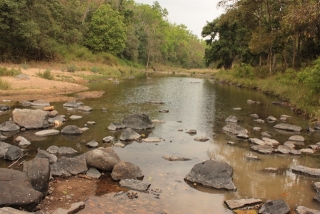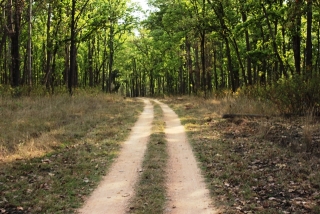/topics/biodiversity
Biodiversity
The Supreme Court and its directions on Interlinking of Rivers (ILR): India and her people will be greatly benefited by its implementation
Posted on 03 May, 2012 07:03 PMAuthor : J. Prabudoss
Viability of Clean Development Mechanism (CDM) projects in India: Study of Chanju CDM project in Chamba district,Himachal Pradesh
Posted on 03 May, 2012 06:30 PMThe present paper is an attempt of the researcher to make a comparative analysis between the expected benefits received by the executing agency under CDM and the actual benefits people are expected to receive from Chanju-I Hydro Electric Project.
The original Jungle Book: A visit to Kanha National Park, Madhya Pradesh
Posted on 28 Apr, 2012 12:37 AM

Kanha National Park, Madhya Pradesh
Draft National Water Policy 2012 and mainstreaming climate change adaptation
Posted on 27 Apr, 2012 01:58 PMClimate change issue is being loudly debated on international level to reduce emission of various gases, and each nation’s responsibility to control the emission.
Sikkim’s organic farming to feature in Satyamev Jayate, Aamir Khan’s first television project on DD1
Posted on 27 Apr, 2012 11:36 AMArticle and Image Courtesy : iSikkim
Citizens voice alarm over recent Supreme Court judgement on interlinking of rivers
Posted on 25 Apr, 2012 10:39 AMThe Supreme Court of India has in its judgment of 27 February 2012 on the interlinking of rivers project, given categorical directions to the Executive Government to implement the ‘project’ as a whole in a time bound manner and has also asked the Centre to appoint a Special Committee to work out the modalities and oversee the implementation of the project.
Exploring the spatial associations between census based socioeconomic conditions and remotely sensed environmental metrics in Assam, North East India – A study by Gary R Watmough
Posted on 23 Apr, 2012 01:50 PMPast studies have found associations between land and poverty, however these studies are usually focused on small areas using ground based studies.
Critical review of the impacts, challenges, prospects and conflict management for vitally needed inter-linking of rivers in India
Posted on 23 Apr, 2012 12:17 PMGuest post by : Er. Radhey Shyam Goel
1. Introduction
Interlinking of rivers project: A disquieting judgement - Ramaswamy Iyer's perspective in the EPW on the recent Supreme Court decision
Posted on 20 Apr, 2012 10:52 PM
1. Introduction
Two writ petitions were filed in 2002 on the subject of interlinking. The judgement finally passed in 2012 directs the implementation of this project. This judgement is disturbing for the following reasons:
"Resources, tribes and the State" - A report on an international seminar, organized by the Arunachal Institute of Tribal Studies at Itanagar, Arunachal Pradesh, in February 2012
Posted on 11 Apr, 2012 04:10 PMGuest post by: Raju Mimi





